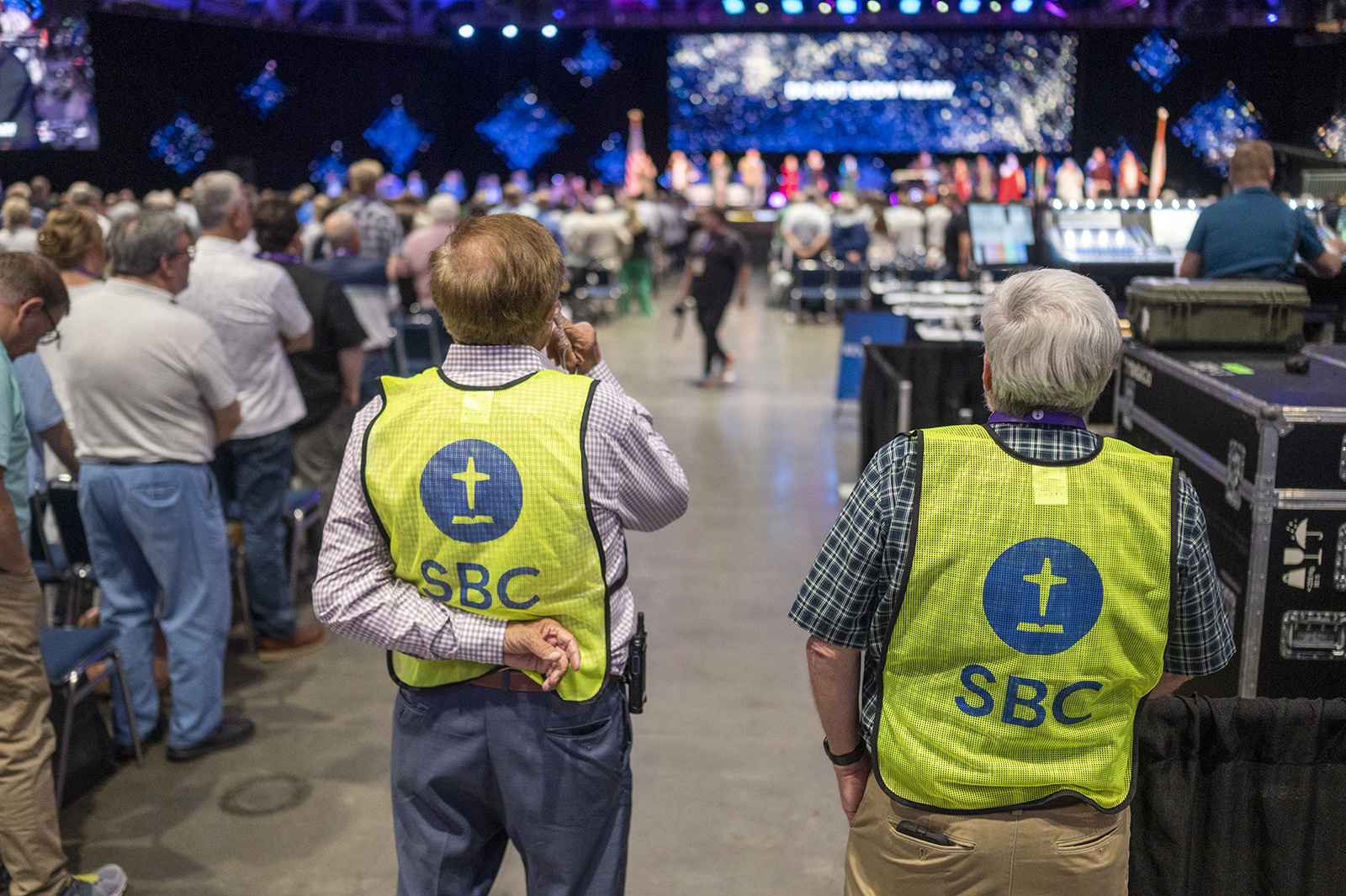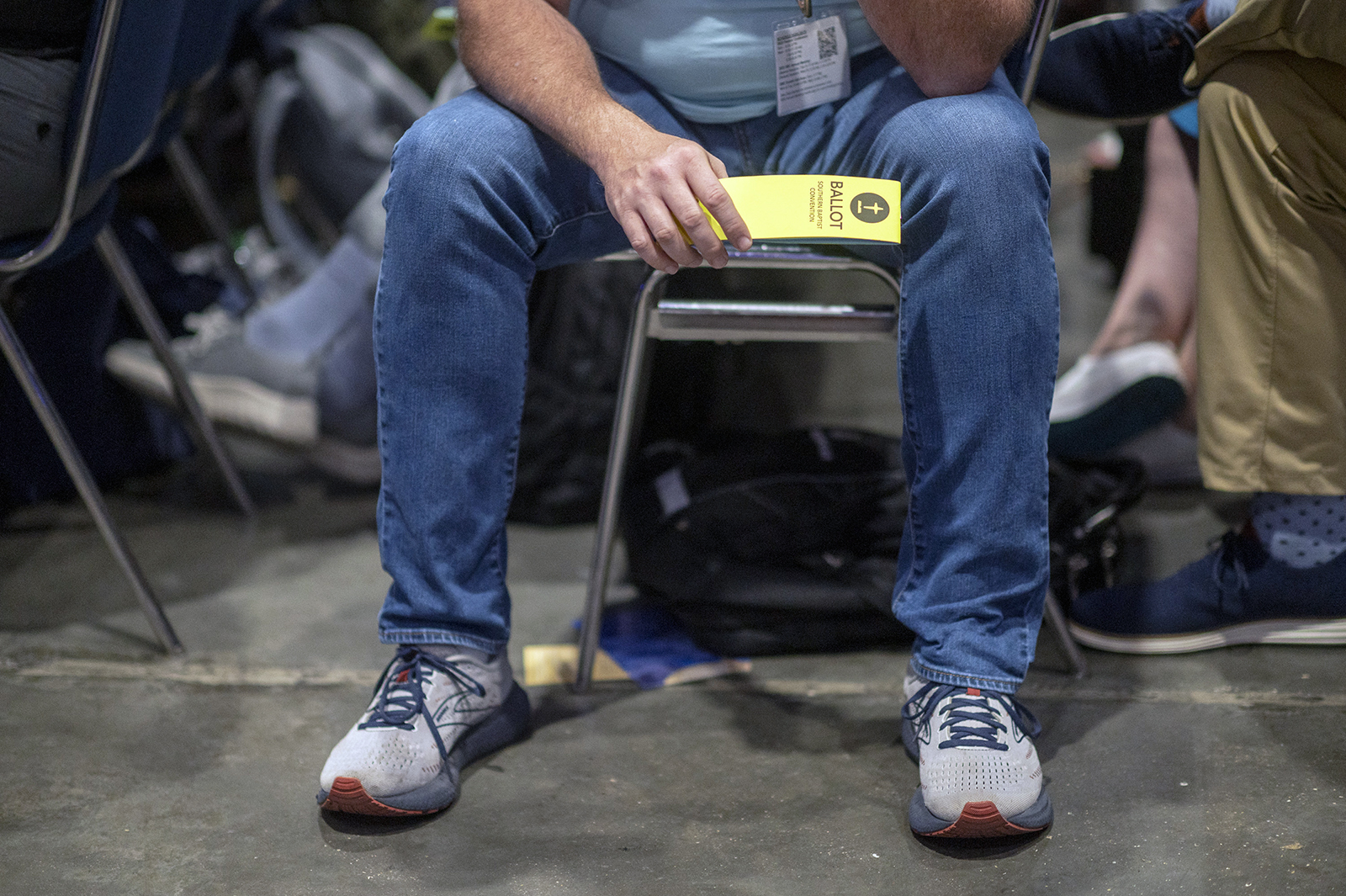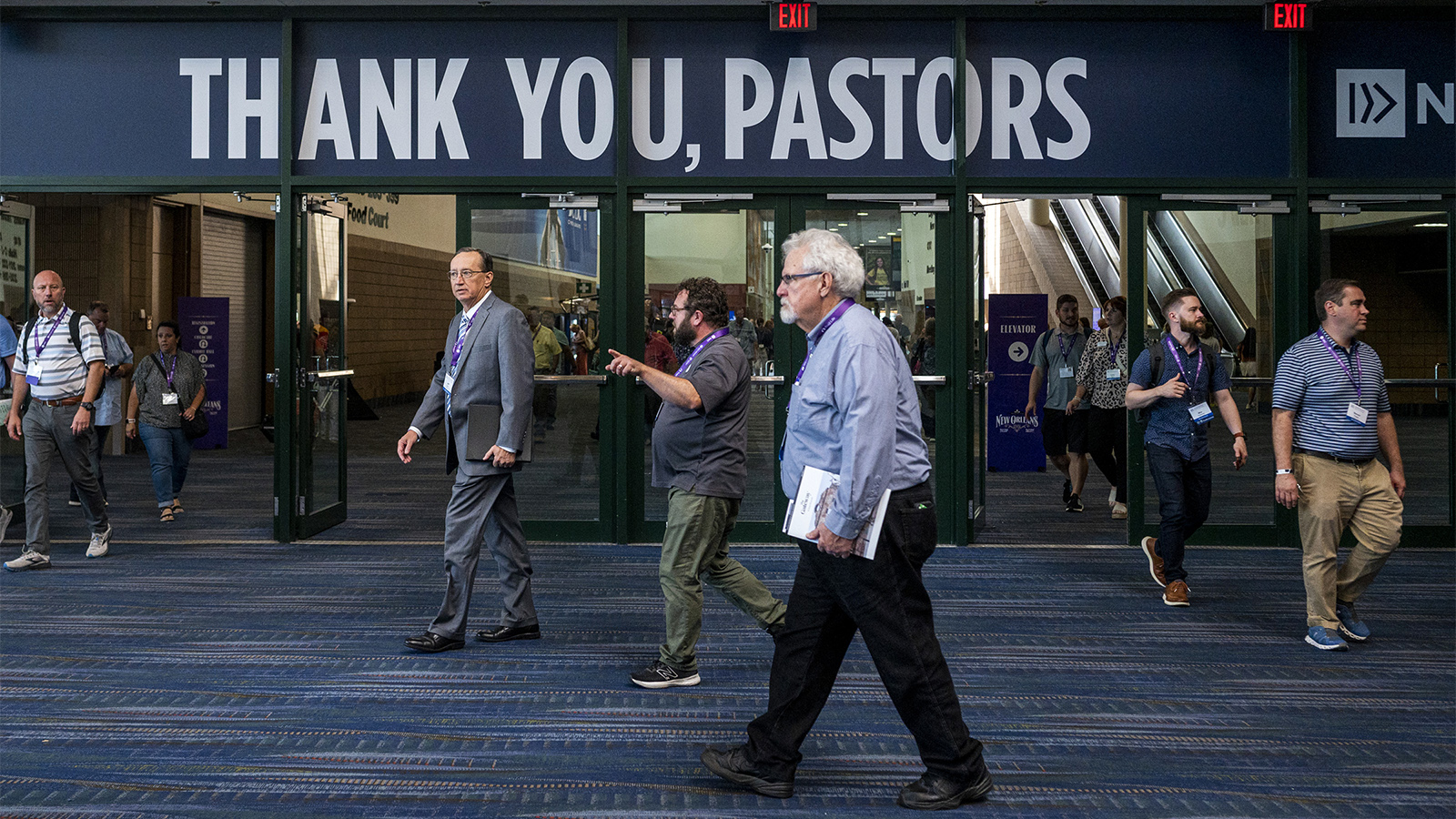(RNS) — For the last 17 years, the Southern Baptist Convention has worked tirelessly to slow its precipitous decline. But now the struggling denomination seems to be actively trying to hasten it.
Earlier this year, the denomination’s Executive Committee expelled five churches for having women serving as pastors, in accord with the denomination’s statement of faith, known as the Baptist Faith and Message, which was amended two decades ago to state that “the office of pastor is limited to men as qualified by Scripture.”
Southern Baptists doubled-down to amend their constitution to say that churches must have “only men as any kind of pastor or elder as qualified by Scripture.”
One of the expelled churches is the 57,000-member Saddleback Church, an influential multi-site congregation and church-planting juggernaut in Southern California founded by Rick Warren, author of the international bestselling book “The Purpose Driven Life.” Warren is not only popular inside the denomination, he’s likely the Southern Baptist preacher most Americans would recognize.
The move is baffling given the shambled state of the denomination, which has been steadily hemorrhaging members since 2007. Last year alone, the SBC reported 416 fewer churches and shed nearly 500,000 members — the largest single drop in 100 years. The SBC’s public image has been severely tarnished by a clergy sex abuse scandal bungled and mishandled by leaders at numerous stages. It’s difficult to imagine a worse possible time for the denomination to wage a war to narrow denominational borders and tighten standards for membership.
The recent move is only the latest in a wave of self-inflicted wounds. In 2019, an investigation by the Houston Chronicle and The San Antonio Express-News uncovered some 700 cases of sexual abuse in Southern Baptist churches spanning decades. A subsequent task force and internal investigation, which was opposed by the hard-right flank in the denomination, unearthed a cover-up scheme in which victims of clergy sexual abuse were stonewalled and denigrated by the denomination’s top leaders.

The Southern Baptist Convention annual meeting in the Ernest N. Morial Convention Center in New Orleans, Wednesday, June 14, 2023. RNS photo by Emily Kask
Members have fled the SBC, too, because of its perpetually aggrieved and bitterly divided politics. While the denomination has been entangled with Republicanism for decades, many Southern Baptists have been disoriented by some of their leaders’ full-throated support of former President Donald Trump, who quite evidently embodies so much that the denomination morally opposes. This partisan turn cost them the allegiance of Beth Moore, the denomination’s most popular Bible study teacher, and Russell Moore, the prominent former head of the SBC’s political arm.
Then there are the recent debates on race. The denomination, overwhelmingly white and founded on tolerance for slavery, opposes any suggestion that institutional and systemic racism even exists. After the six SBC seminary presidents, all white men, released a sweeping statement in November 2020 condemning so-called critical race theory as “antithetical to the Bible,” many prominent Black pastors, including Charlie Dates of Chicago, publicly broke with the SBC.
With these PR nightmares swirling and membership swooning, the SBC chose this week to further alienate Warren, a fourth-generation Southern Baptist whose credentials and credibility any declining institution would leap to capitalize on.
In the weeks leading up to the gathering in New Orleans, Warren launched an online campaign to convince the SBC that this issue was not worth dividing over. Having turned over Saddleback’s pulpit last summer to a younger man, his own comfortable retirement assured, Warren told the press this week that the SBC “can’t hurt me,” explaining that he was fighting instead for his denomination. “It’s not really smart when you are losing half a million members a year to kick out people who want to fellowship with you,” he told reporters.

Rick Warren speaks with media at the Southern Baptist Convention annual meeting in New Orleans, Wednesday, June 14, 2023. RNS photo by Emily Kask
In his speech from the floor of the convention center in New Orleans appealing the decision to disfellowship his church, Warren noted that the denomination’s constitution states that churches must “closely identify, not completely identify” with the statement of faith: “The Baptist Faith and Message is four thousand and thirty-two words. Our church disagrees with only one word. That’s 99.99% in agreement. Isn’t that close enough?”
Not, apparently, close enough for his fellow Southern Baptists who voted resoundingly to send Saddleback packing. The vote to turn their back on a storied pastor they once revered and sever ties with its largest congregation was at once flabbergasting and completely expected.
You cannot understand a debate apart from the cultural context in which the debate takes place. And the vote against women pastors arises in part from a fear that has gripped the wider conservative world about gender norms and definitions. It’s not incidental that the ultraconservative SBC leader and pastor Mike Stone preached a sermon ahead of the annual meeting in which he accused those who advocate for women pastors of supporting “theological transgenderism,” a nonsense phrase concocted to connect female church leaders in fundamentalist minds with the controversy unfolding around gender in the wider culture.
And so, the patriarchal men who have always held the lion’s share of power in the SBC voted to take a historically unprecedented hard line against women pastors and those who affirm them. A victory, they would claim, but at what cost?
It is estimated that nearly 1,900 SBC churches currently have a woman serving in a pastor role among the denomination’s 47,000 churches. Women have served in these roles long before and since their supposed disqualification in 2000. Subjecting these women and their churches to the coming inquisition will accelerate the exodus of Southern Baptists from the denomination.
The day after the annual meeting ended, First Baptist Church of Gainesville, Georgia, announced that they “accept the reality that we are no longer welcome at the SBC table and sever all remaining ties with the SBC and its partner organizations.” The church, which has employed women pastors on staff for years, outlined bullying tactics by SBC leaders, including publishing the names and photos of female staff members that First Baptist said had compromised their safety and well-being. The letter said church leadership was “saddened and infuriated” by the SBC’s “regrettable compromise on local church autonomy.”

An SBC messenger holds a ballot at the Ernest N. Morial Convention Center in New Orleans, Tuesday, June 13, 2023. RNS photo by Emily Kask
Here First Baptist captures why the vote in New Orleans is much more than another PR gaffe. Enforcing the ban on female pastors changes the nature of the denomination itself. As Warren implied, the Baptist Faith & Message has historically functioned only as a summary of common beliefs, not as a binding or governing document. What held the SBC together traditionally is trust and an enthusiasm for spreading the gospel, not doctrine and rules.
The decision changes Southern Baptists’ relationship with the countless sisters and mothers of countless churches as well. I was raised Southern Baptist, and I remain deeply grateful by the way it imbued me with a love for the Bible and for the God we meet in its pages. This tradition first taught me what it meant to live with generosity and grace, to love my neighbor as myself. Many people, myself included, count ourselves profoundly blessed to have received the love, instruction and mentorship of Southern Baptist women. Those people, and that grace, have been left behind, disrespected and dismissed by the denomination this week.
Many of us who have left the SBC — because of the Christian convictions it instilled in us, not in spite of them — are heartbroken by what we witnessed this week. But we are not surprised.
This dissolution wasn’t achieved in New Orleans this week. Beginning in the late 1970s, fundamentalist factions seized control of the Southern Baptist Convention’s agencies and seminaries, purging so-called liberals and installing themselves in positions of power, motivated by the authority of the Bible and a commitment to the “Great Commission,” Jesus’ charge to his disciples to take the gospel to the ends of the earth.
That’s the mythology that has been spun by the victors anyway. But as the late Southern Baptist preacher Adrian Rogers once said, “It is a mighty thin pancake that does not have two sides.”

Attendees pass through the Ernest N. Morial Convention Center during the Southern Baptist Convention annual meeting in New Orleans, Wednesday, June 14, 2023. RNS photo by Emily Kask
If you ask Baptists who found themselves on the other side of this struggle — many of them far from “liberal” by any modern definition — they’ll describe the ordeal as an institutional power grab by religious fundamentalists who wished to remake the Southern Baptist Convention from a big tent movement that allowed for doctrinal diversity into something harsher, its own image.
Fundamentalists are by nature perpetual malcontents ever in need of a devil to fight. Once the so-called liberals were purged from their ranks, critics once predicted, the fundamentalists would eventually turn on themselves, and the denomination would descend into endless moral panic, litmus testing and tribalism that would eventually tear the denomination apart.
Their warnings seem like prophecies now. The fundamentalists have won yet again, but theirs is a Pyrrhic victory. Having successfully fundamentalized the Southern Baptist Convention, they’ve ensured that the denomination’s glory days are now numbered.
But don’t expect the denomination’s establishment leaders to acknowledge the disastrous nature of this week’s events. Many are already busy downplaying the deleterious impact of this week’s events or just ignoring them completely. Their denials are hardly surprising. As the late Upton Sinclair once pointed out, “It is difficult to get a man to understand something when his salary depends on his not understanding it.”
But make no mistake: The Southern Baptist Convention is a denomination on fire. It’s reeling from scandal, tarnished in the eyes of the public, confused as to what unites it and is contracting at an unprecedented rate. Data does not lie, and in this case, the data all points in one direction. The denomination’s demise shows no sign of slowing, and after New Orleans, we have no reason to believe it will reverse course in the foreseeable future.






